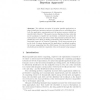Free Online Productivity Tools
i2Speak
i2Symbol
i2OCR
iTex2Img
iWeb2Print
iWeb2Shot
i2Type
iPdf2Split
iPdf2Merge
i2Bopomofo
i2Arabic
i2Style
i2Image
i2PDF
iLatex2Rtf
Sci2ools
117
click to vote
EUROPAR
2004
Springer
2004
Springer
Scheduling Under Conditions of Uncertainty: A Bayesian Approach
The efficient execution of irregular parallel applications on shared distributed systems requires novel approaches to scheduling, since both the application requirements and the system resources exhibit an unpredictable behavior. This paper proposes Bayesian decision networks as the paradigm to handle the uncertainty a scheduler has about the environment’s current and future states. Experiments performed with a parallel ray tracer show promising performance improvements over a deterministic approach of identical complexity. These improvements grow as the level of system sharing and the application’s workload irregularity increase, suggesting that the effectiveness of decision network based schedulers grows with the complexity of the environment being managed.
Related Content
| Added | 01 Jul 2010 |
| Updated | 01 Jul 2010 |
| Type | Conference |
| Year | 2004 |
| Where | EUROPAR |
| Authors | Luís Paulo Santos, Alberto José Proença |
Comments (0)

